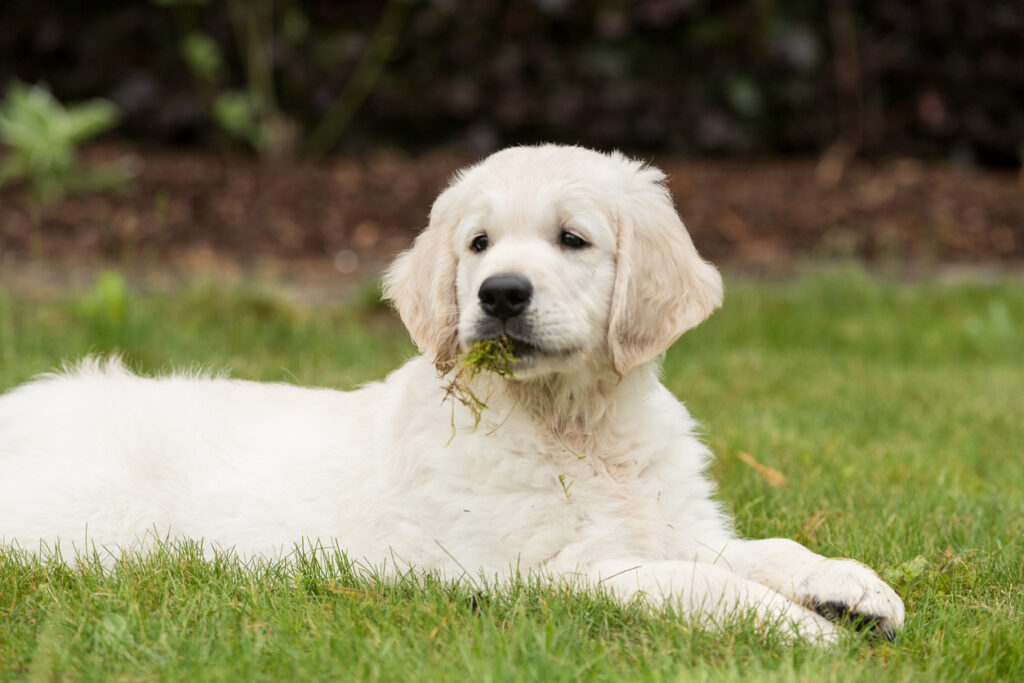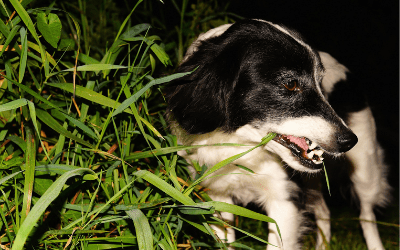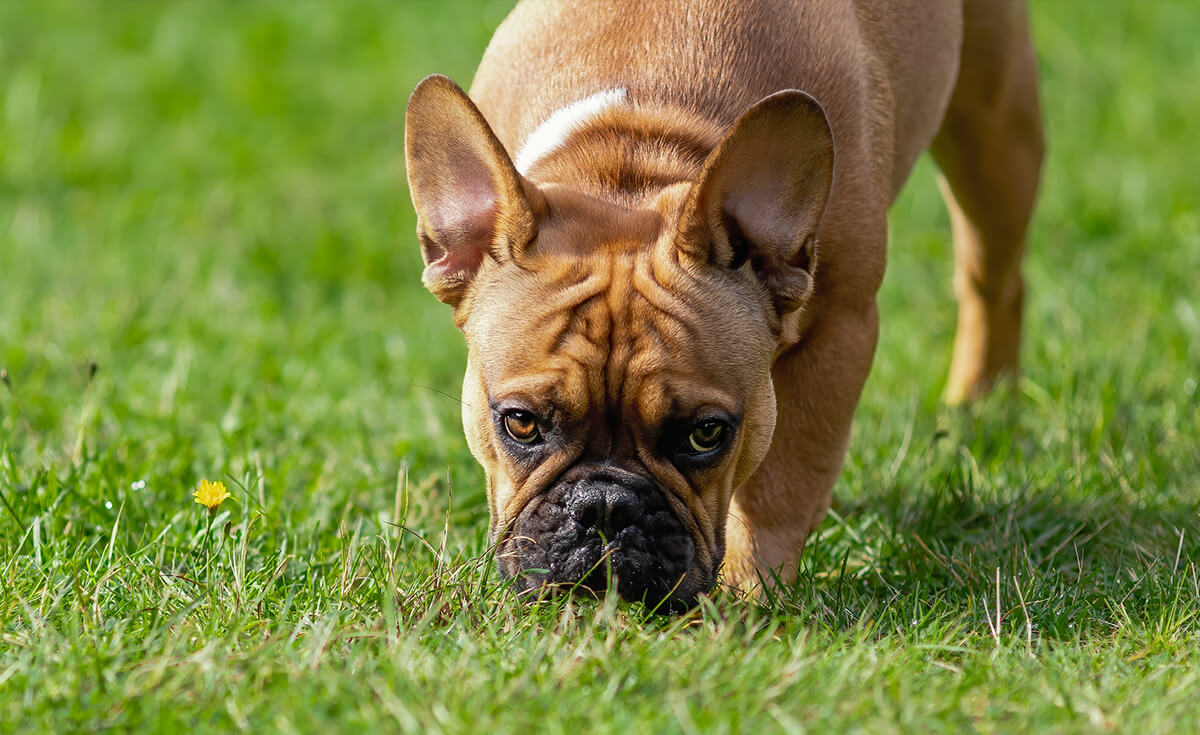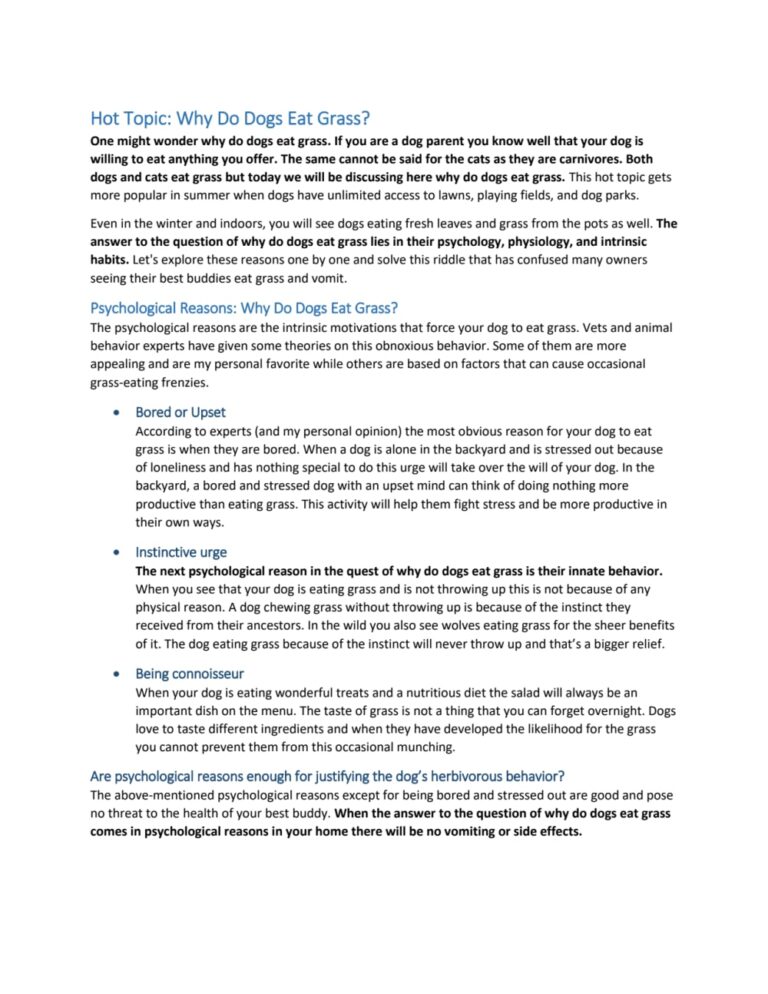When dogs eat grass and vomit, it is often due to an upset stomach or a dietary deficiency. However, if your dog keeps eating grass and vomiting, it is best to consult with a vet to rule out any underlying health issues.
Grass can act as a natural antacid for dogs, helping them soothe their upset stomachs. While occasional grass-eating is usually not a cause for concern, it is important to ensure that the grass your dog consumes is free from any chemicals or pesticides.
If you notice your dog regularly eating grass and throwing up, it is always best to seek professional advice.
Understanding The Behavior
Why Does My Dog Eat Grass And Throw Up is one of the common concerns that dog owners have. It can be puzzling to see your furry friend munching on grass only to vomit shortly after. But, is this behavior normal? In this blog post, we will delve into the reasons why dogs eat grass and vomit, and whether it is a cause for concern.
Why Do Dogs Eat Grass?
Dogs eating grass is a behavior that has been observed in many breeds and can vary from occasional munching to more frequent consumption. There are several reasons why dogs engage in this behavior:
- Upset stomach: Grass can act as a natural emetic, helping dogs induce vomiting when they have an upset stomach. It may serve as a cleansing mechanism for your dog’s digestive system.
- Boredom: Dogs may eat grass out of sheer boredom or to alleviate stress. It can provide them with a temporary distraction or stimulation.
- Fiber increase: Some dogs eat grass to increase fiber intake in their diet. This behavior may indicate a dietary need for more plant-based roughage.
- They like it: For certain dogs, there may not be a specific reason other than they simply enjoy the taste and texture of grass.
- Dietary deficiencies: In rare cases, dogs may eat grass if they have nutritional deficiencies, such as a lack of vitamins or minerals in their diet.
- Digestive disorders: Dogs with gastrointestinal issues, such as inflammatory bowel disease (IBD) or other digestive disorders, may be inclined to eat grass as a way to find relief or soothe their discomfort.
It is essential to observe your dog’s behavior and overall health to determine the underlying cause of their grass-eating habits.
Why Do Dogs Vomit After Eating Grass?
After consuming grass, some dogs may vomit. The vomiting can be a result of the following factors:
- Grass as an emetic: As mentioned earlier, grass can trigger dogs to vomit, aiding in the removal of any indigestible or irritating substances from their stomachs.
- Indigestible components: Certain parts of grass, such as long blades or fibrous stems, can be difficult for dogs to digest. These components may cause irritation in their gastrointestinal tract, leading to vomiting.
- Other underlying health issues: It is important to note that vomiting can also be a symptom of other health problems. If your dog repeatedly vomits after eating grass, it may be indicative of a more significant issue. Consulting with your veterinarian is recommended to rule out any underlying medical conditions.
Is It Normal For Dogs To Eat Grass And Vomit?
Eating grass and occasionally vomiting may be relatively normal for dogs. If your dog eats grass, vomits once, and appears fine afterward, it is likely that they have resolved whatever was bothering their stomach. However, if your dog continues to eat grass and vomit frequently, it may be a cause for concern.
It is always best to consult with your veterinarian if you have any worries about your dog’s behavior. They can provide a proper diagnosis and guide you on the appropriate steps to take. Remember, your veterinarian is your best resource for determining whether your dog’s grass-eating and vomiting behavior is within the realm of normal.
In conclusion, understanding why dogs eat grass and vomit is crucial in determining whether it is a behavior to be worried about or not. By being attentive to your dog’s overall health and consulting with your veterinarian, you can ensure their well-being and provide the best care.

Credit: berthoudanimalhospital.com
Possible Reasons
If your dog eats grass and throws up, possible reasons could include an upset stomach, boredom, liking the taste of grass, dietary deficiencies, or digestive disorders. It’s best to consult your vet if your dog continues to eat grass and vomit.
Avoid letting them eat grass treated with fertilizers or pesticides.
Upset Stomach
If you’ve ever wondered why your dog eats grass and then throws up, one possible reason is an upset stomach. Dogs have a natural instinct to self-medicate when they’re feeling nauseous, and eating grass can help induce vomiting to relieve their discomfort. Grass acts as a natural emetic, helping your furry friend expel any irritants or toxins that may be causing their upset stomach. So, if you notice your dog munching on grass and then throwing it up, it could be a sign that they’re trying to soothe their tummy troubles.Boredom
Another possible reason why dogs eat grass and vomit is simply out of boredom. Dogs that are left alone for long periods can become restless and look for ways to entertain themselves. Chewing on grass can provide a temporary distraction and alleviate their boredom. However, this behavior may lead to vomiting if their stomach can’t handle the grass or if they ingest other substances along with it. To prevent this, make sure your dog gets plenty of mental and physical stimulation to keep them occupied and prevent them from resorting to grass eating as a means of entertainment.Dietary Deficiencies
Some dogs may eat grass and throw up due to dietary deficiencies. When their body is lacking certain nutrients, they may instinctively seek out grass as a source of fiber and other nutrients. While grass itself doesn’t offer much nutritional value, the act of eating it can stimulate their digestive system and help them eliminate any built-up toxins. If you suspect that your dog’s diet may be lacking in certain nutrients, it’s essential to consult with your vet to ensure they’re getting a balanced and appropriate diet.Digestive Disorders
Digestive disorders can also be a contributing factor to why dogs eat grass and vomit. Conditions such as food allergies, gastrointestinal infections, or pancreatitis can cause discomfort and an urge to relieve it by consuming grass. If your dog frequently exhibits this behavior, it is crucial to have them evaluated by a veterinarian to determine the underlying cause of their digestive issues and develop an appropriate treatment plan.Inflammatory Bowel Disease (ibd) In Dogs
Inflammatory bowel disease (IBD) is a chronic condition that affects a dog’s digestive system. It occurs when the immune system mistakenly attacks the intestinal lining, causing inflammation and leading to various gastrointestinal symptoms, including vomiting and diarrhea. Dogs with IBD may eat grass as an attempt to alleviate their discomfort or as a result of changes in their gut microbiome. If you suspect your dog has IBD, it is essential to consult with your vet for a proper diagnosis and treatment plan.In conclusion, there are several possible reasons why dogs eat grass and vomit. These include upset stomach, boredom, dietary deficiencies, digestive disorders, and inflammatory bowel disease. If your dog exhibits this behavior frequently or has other concerning symptoms, it is always best to seek veterinary advice to ensure their health and well-being.Addressing The Behavior
If your dog eats grass and then vomits, it could be due to an upset stomach, boredom, or a dietary deficiency. While occasional grass consumption may not be a cause for concern, if it becomes a regular behavior, it’s best to consult with a veterinarian to rule out any underlying digestive disorders or health issues.
Should I Be Worried If My Dog Eats Grass And Throws Up?
If your dog eats grass and vomits occasionally and seems fine afterward, there’s usually no need to worry. Dogs sometimes eat grass to help relieve an upset stomach or to induce vomiting when they feel unwell. It’s their natural way of self-medicating.However, if your dog keeps eating grass and vomiting frequently, it could be a sign of an underlying issue that needs to be addressed. In such cases, it’s best to consult your veterinarian to determine the cause and address any potential health concerns.Should I Stop My Dog From Eating Grass?
While it’s unlikely that dogs derive much nutritional value from eating grass, occasional grass consumption is generally considered normal behavior for healthy dogs. As long as your dog is regularly wormed and does not have any adverse reactions, there’s usually no need to stop them from eating grass.However, it’s important to note that dogs should never be allowed to consume grass that has been treated with fertilizers, herbicides, or pesticides. These chemicals can be toxic and pose a significant risk to your dog’s health.When Should I Be Concerned About My Dog Throwing Up?
If your dog is throwing up frequently or consistently, it’s important to monitor their overall health and behavior. While occasional vomiting can be normal, persistent vomiting may indicate an underlying issue that requires veterinary attention. You should be concerned if your dog exhibits the following symptoms along with vomiting:1. Loss of appetite or refusal to eat 2. Lethargy or weakness 3. Diarrhea or changes in bowel movements 4. Blood in vomit or stool 5. Abdominal pain or discomfort 6. DehydrationIf your dog shows any of these signs, it’s crucial to consult your veterinarian promptly. They will be able to diagnose the underlying cause of the vomiting and provide the appropriate treatment to help your furry friend feel better.In conclusion, if your dog eats grass and vomits occasionally without any other symptoms, it’s generally not a cause for concern. However, if the behavior persists or is accompanied by other worrisome symptoms, it’s best to consult your vet for a proper evaluation and guidance. Remember to always prioritize your dog’s health and well-being.
Credit: vcahospitals.com

Credit: www.earthbornholisticpetfood.com
Frequently Asked Questions On Why Does My Dog Eat Grass And Throw Up
Should I Be Worried If My Dog Eats Grass And Throws Up?
If your dog eats grass and throws up but seems fine, it’s likely nothing to worry about. However, if it continues to happen, it’s best to consult your vet. Grass eating can be normal, but avoid treated grass.
Should I Stop My Dog From Eating Grass?
Grass eating in dogs is typically harmless. If your dog eats grass and throws up occasionally, it’s usually not a cause for concern. However, if it becomes a frequent occurrence, it’s best to consult a vet. Make sure to prevent your dog from eating grass treated with chemicals.
When Should I Be Concerned About My Dog Throwing Up?
If your dog eats grass and throws up but seems fine, they’ve likely resolved the issue. However, if they continue to eat grass and vomit, it’s best to consult a vet. Never let your dog eat grass treated with chemicals.
Why Does My Dog Gag And Then Eat Grass?
When dogs gag and eat grass, it is usually because they have an upset stomach and they want to induce vomiting. They may also eat grass out of boredom or to increase their fiber intake. However, if your dog keeps eating grass and vomiting, it is best to consult a vet.
Conclusion
If you’re ever concerned about your dog eating grass and throwing up, it’s important to consult your vet. While occasional grass consumption might not be a cause for worry, persistent vomiting could indicate an underlying issue. Grass eating in dogs can be attributed to various reasons, including upset stomach, dietary deficiencies, boredom, or even liking the taste and smell of grass.
Remember to ensure that the grass your dog eats is free from any harmful chemicals or pesticides. Ultimately, your vet will be able to provide appropriate advice and guidance based on your dog’s specific situation.



